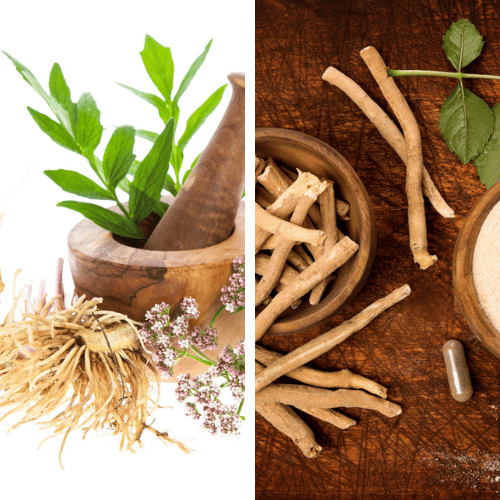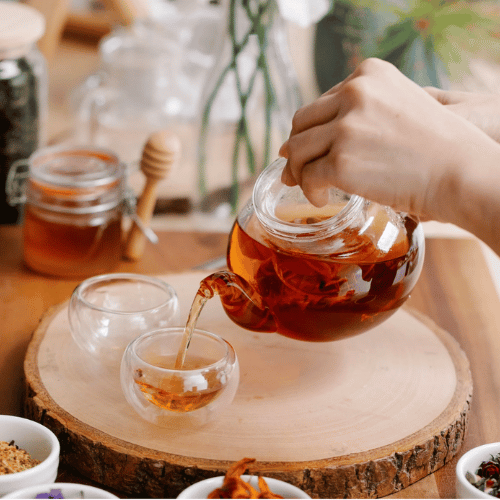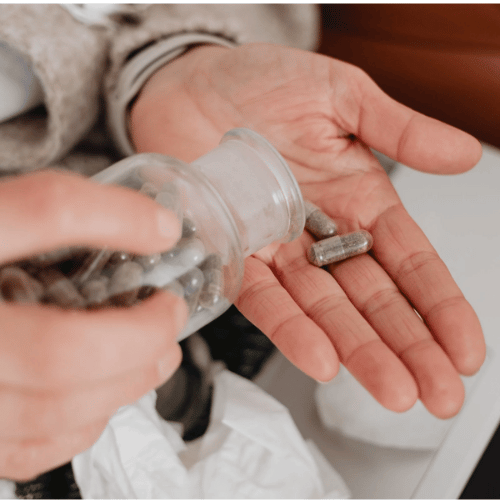Does the modern world’s relentless pace leave you feeling stressed and struggling to fall asleep? If so, you’re not alone. Many people turn to natural remedies to help them unwind and enjoy a good night’s rest. Valerian Root and Ashwagandha are two popular herbal options, but which one is right for you? In this comprehensive comparison, we’ll answer the question: “is valerian or ashwagandha better?” We’ll delve into the healing properties of these ancient herbs and guide you on the path to relaxation and rejuvenation.
Key Takeaways
- This article explores the differences between Valerian Root and Ashwagandha to help determine which is best suited for addressing sleep disorders and reducing anxiety.
- Both herbs have been used to promote restful sleep, reduce anxiety levels, improve cognitive abilities, possess anti-inflammatory properties and act as an adaptogen.
- It is important to consult with a healthcare provider before taking either herb due to potential side effects or interactions with medications.
Understanding Valerian Root and Ashwagandha

Valerian Root and Ashwagandha have been used for centuries in various traditional medicine systems worldwide to alleviate sleep disorders and reduce anxiety levels. Both herbs are known for their potential health benefits, particularly in promoting relaxation and managing stress levels.
However, they have distinctive differences in their effects on the body and the manner in which they are utilized. We will now explore these two herbal remedies to determine which one might best suit your needs.
Valerian Root
Valerian Root is a herb native to Asia and Europe, renowned for its calming and sedative properties. Traditionally, it has been used as a sleep supplement to improve sleep quality, relieve anxiety, and address premenstrual syndrome (PMS) symptoms.
Clinical studies have shown that Valerian Root can:
- Reduce anxiety levels
- Enhance sleep quality
- Induce relaxation
- Relieve menstrual cramps
- Help with digestive issues
Ashwagandha
Ashwagandha root, a small shrub indigenous to India, has been used for millennia for various conditions, including helping people fall asleep and improving their sleep quality. It is a key component of traditional Ayurvedic medicine, with its Sanskrit name translating to “the smell of a horse,” implying that it may provide one with the strength of a stallion.
Research shows that Ashwagandha possesses the following benefits:
- Anti-inflammatory and antioxidant properties, offering protection against chronic diseases
- Stress alleviation
- Mental wellbeing
- Cognitive performance
Effects on Sleep and Anxiety

When it comes to sleep and anxiety, both Valerian Root and Ashwagandha have been used as sleep aids to enhance sleep quality and alleviate anxiety. Valerian Root is known for its calming effect, enhancing mood, and maintaining a tranquil state.
On the other hand, Ashwagandha increases cognitive abilities, acts as an anti-depressant, and increases serotonin levels for relaxation. Which of these herbs would be the best choice for promoting a peaceful night’s sleep and a calm mind?
Valerian Root for Sleep and Anxiety
Valerian Root helps improve sleep quality and reduce anxiety by increasing the level of gamma-aminobutyric acid (GABA), a chemical that aids in the regulation of nerve cells and can bring about a calming effect. Studies have shown that Valerian Root can reduce sleep latency and improve sleep quality.
In one study, participants who took Valerian Root experienced restful sleep, as they reached deep sleep 8 minutes sooner than those who received the placebo. Additionally, 89% of the Valerian Root takers reported improved sleep quality, and 44% reported perfect sleep.
Ashwagandha for Sleep and Anxiety
Ashwagandha, a natural sleep aid, supports better sleep and assists in managing anxiety by:
- Reducing stress and anxiety levels, both of which can contribute to better sleep
- Having adaptogenic properties that help the body deal with persistent stress
- Reducing cortisol levels, a hormone related to stress, while promoting relaxation
Although Ashwagandha’s effect on sleep is more of a secondary benefit, it has been shown to improve sleep quality and reduce sleep onset latency in individuals with insomnia.
Benefits for Specific Health Conditions

While both Valerian Root and Ashwagandha are effective in addressing sleep and anxiety issues, they also provide relief for various health conditions. Valerian Root is more beneficial for anxiety, PMS symptoms, and general cognitive function, while Ashwagandha can mitigate symptoms of anxiety, depression, insomnia, stress, fatigue, and cognitive decline.
Which of these herbs would be the most beneficial for your specific health concerns?
Valerian Root
Valerian Root is particularly effective in treating anxiety, PMS symptoms, and improving cognitive function. It can effectively alleviate symptoms of obsessive-compulsive disorder (OCD) and decrease hyperactivity in children. Additionally, Valerian Root provides relief from painful menstruation and premenstrual syndrome (PMS) symptoms, as well as regulating mood.
However, potential side effects such as headaches, dizziness, and stomach upset should be considered. Consultation with a healthcare professional before taking Valerian Root is advisable.
You also might want to check out our comprehensive review of what we believe to be the top Valerian Root supplements on the market today. Just click here to check out that review:
Ashwagandha
Ashwagandha has been known to address various health issues, such as depression, anxiety, and chronic fatigue syndrome. Research shows that ashwagandha supplements can reduce inflammation, enhance cognitive function, and enhance the immune system.
Though Ashwagandha is generally considered safe and well tolerated, some individuals may experience mild side effects, such as upset stomach, diarrhea, and nausea. Just like with Valerian Root, consultation with a healthcare provider is advised before taking Ashwagandha due to its potential interaction with certain medications.
Yes, you guessed it, we also did a comprehensive review of what we believe to be the crème de la crème of Ashwagandha supplements as well. It never hurts to arm yourself with more information:
Safety and Side Effects
It is important to consider the safety profiles and potential side effects when evaluating Valerian Root and Ashwagandha. Both herbs are generally considered safe and well tolerated, although some individuals may experience mild side effects.
Before taking either of these herbs, consulting a healthcare provider is crucial as they may interact with certain medications or supplements.
Valerian Root
Valerian Root is generally safe to consume, but it has been reported to cause headaches, dizziness, and gastrointestinal upset in some cases. It may also interact with sedatives, antidepressants, and anticonvulsants, so it’s essential to consult a healthcare professional before taking Valerian Root if you’re using these medications.
Additionally, Valerian Root is not recommended for use during pregnancy.
Ashwagandha
Ashwagandha is also generally considered safe, with mild side effects, such as upset stomach, diarrhea, and nausea, reported in some cases. It’s essential to consult a healthcare provider before taking Ashwagandha, as it may interact with certain medications.
Moreover, Ashwagandha is not recommended for individuals with diabetes or those taking medication to reduce their blood sugar levels.
Combining Valerian Root and Ashwagandha

For those seeking the benefits of both Valerian Root and Ashwagandha, combining the two herbs can yield a synergistic effect, aiding in the reduction of anxiety and the enhancement of sleep.
A randomized, double-blind, placebo-controlled clinical trial demonstrated that the combination of Ashwagandha and Valerian Root significantly helped relieve stress, diminish mental stress, sleep difficulties, and anxiety symptoms in comparison to the placebo group, contributing to effective stress reduction.
Nevertheless, seeking a healthcare provider’s advice before starting any new supplement regimen is crucial.
Dosage and Usage Recommendations
Following proper dosage and usage guidelines based on research and expert recommendations is crucial to reap the full benefits of Valerian Root and Ashwagandha.
While the safety of long-term use of Valerian Root is currently unknown, Ashwagandha is generally considered safe for long-term use.
Valerian Root
The recommended daily dosage of Valerian Root for anxiety is between 400-900 milligrams, this is the maximum dosage as well, and its best taken at bedtime for insomnia.
Before taking Valerian Root, consultation with a healthcare professional is recommended, and you should be aware that its safety is unestablished for its use during pregnancy.
Ashwagandha
For Ashwagandha, the recommended dosage is 500-1000mg per day, with food. The maximum recommended dosage varies, but generally falls within the range of 125 mg to 5,000 mg per day.
Before taking Ashwagandha, it is recommended to consult a healthcare provider due to its potential interaction with certain medications.
Personalizing Your Herbal Regimen
Your individual needs, preferences, and health goals will ultimately determine your choice in the valerian root vs ashwagandha debate. Consulting with a trained herbalist or healthcare provider can help ensure that your specific needs are met and the most suitable herbs and dosages are recommended. They can also guide you on different methods of administration, such as tinctures, capsules, or teas, based on your preferences and health objectives.
Allowing a few weeks to experiment with each herb is advisable since their effects can vary from person to person. By evaluating your health objectives, lifestyle, and potential side effects, you can make an informed decision on which herb is best suited for you and personalize your herbal regimen for optimal results.
Summary
In conclusion, both Valerian Root and Ashwagandha offer unique benefits for sleep, anxiety, and various health conditions. By understanding their properties, safety profiles, and usage recommendations, you can make an informed decision on which herb best aligns with your needs and preferences. With the proper guidance and personalization, these ancient herbal remedies can bring tranquility and rejuvenation to your modern, fast-paced life.
Frequently Asked Questions
Can Valerian Root and Ashwagandha be taken together?
Valerian Root and Ashwagandha can be taken together, offering potential synergistic effects and enhanced benefits.
What are the potential side effects of Valerian Root?
Valerian root may cause side effects such as headaches, dizziness and gastrointestinal discomfort.
These side effects can be mild or severe, depending on the individual and the dosage. It is important to talk to your doctor before taking any supplement containing Valerian root.
What are the potential side effects of Ashwagandha?
Ashwagandha may cause upset stomach, diarrhea, and nausea.
Additionally, it may worsen symptoms of thyroid disorders and interact with sedatives and blood thinners.
What is the recommended dosage for Valerian Root and Ashwagandha?
For Valerian Root, the recommended dosage is 300-600 mg daily, and for Ashwagandha, 500-600 mg daily.
How can I choose between Valerian Root and Ashwagandha?
When selecting between Valerian Root and Ashwagandha, consider your individual needs and preferences as well as any health goals.
It is advisable to consult a healthcare provider or trained herbalist before making your decision.
Thanks for taking this journey with us as we compared and contrasted Valerian Root and Ashwagandha. And, don't forget to check out our review articles on both of these powerful herbals!
Also, don't forget to come back here soon to check out our next review of another awesome supplement – we’re always looking out for YOU!
*We are not qualified medical advisors. The content here is only based on our personal opinions and should NOT be used as a substitute for a healthcare professional's advice!











Member discussion